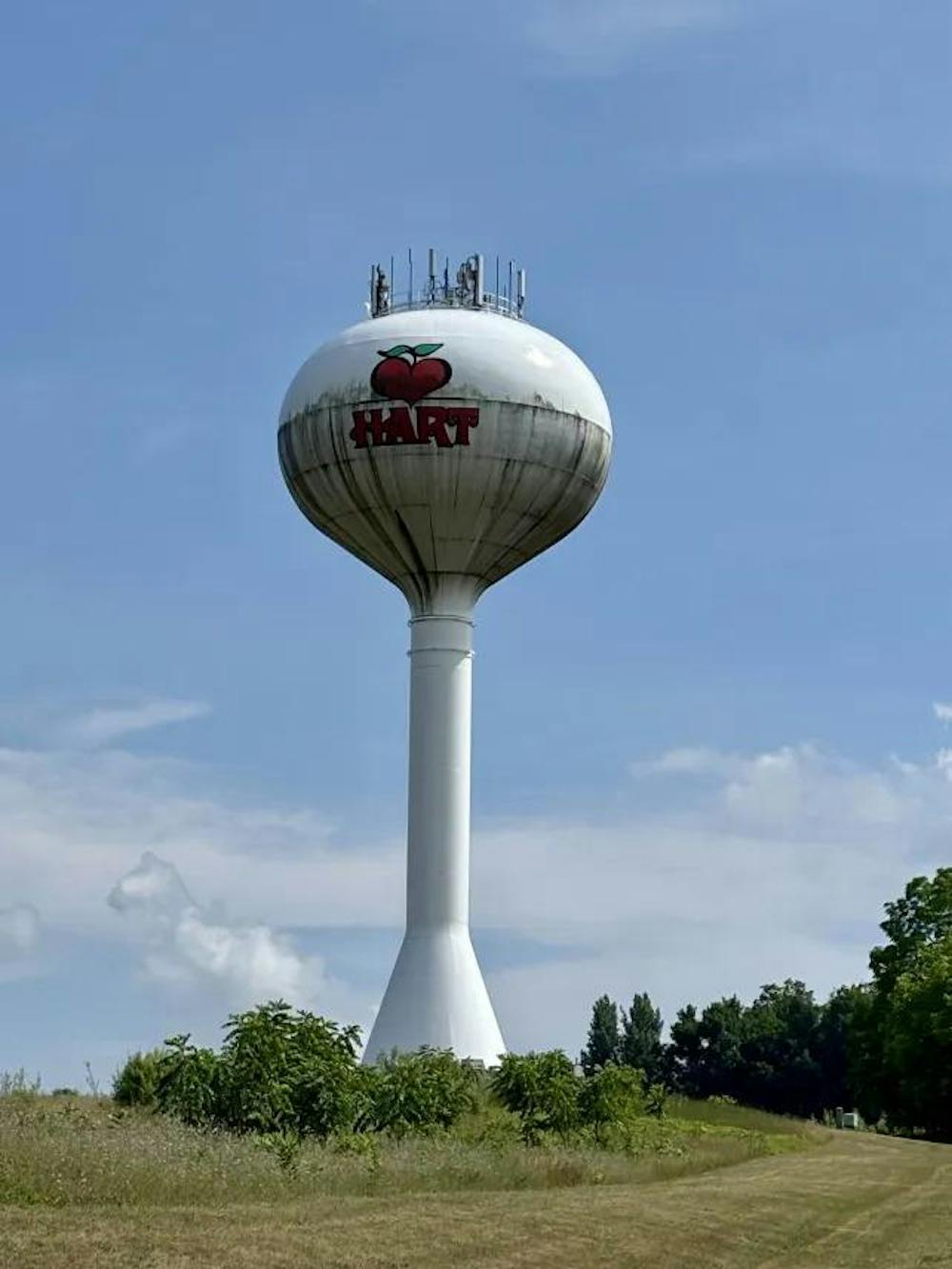At the July 8 City of Hart Council meeting, City Manager Rob Splane brought to the attention of the council a peculiar situation - the city does not own the land on which the water tower sits. In fact, the city has not owned the land for the past 22 years. In 2003, a parcel of land south of the GHSP production plant in Hart’s industrial district was sold to the plant’s parent company, JSJ Corporation, including “in error” the water tower land.
Currently, Splane is in talks with JSJ Corp. to amend this oversight, and JSJ has been “open to discussion of selling the property back to the city at a reasonable rate or [granting] some sort of easement.” He expects they may have the property back, or at least be working towards that goal, in the next month or so.

Council Member Jim Cunningham stated, “Basically, you’re saying our water tower is not on city property?” To which Splane replied, “Correct. We’re going to fix that.”
Current Council Member Betty Root served a term during 2003 when the land sale took place. The Echo reached out to Splane regarding this issue, and though a response was not received by press time, he did state during the July 8 meeting that more information would be available the next time council meets on July 22.
The meeting also featured a significant number of public comments. The first came from one long-time seasonal camper at John Gurney Park, representing over 30 similar campers who are upset with the anticipatory vacancy order of their lots scheduled at the end of the summer season. In compliance with this order, all trailers must be moved from the lots and any decks or auxiliary sheds must be removed.
For many years prior, campers were allowed year-round parking of their trailers. This has changed in recent years so the city could perform maintenance on the grounds. The commenter asserted that no maintenance had been done in years prior, and does not believe any of the maintenance described by the city would warrant the removal of trailers, decks and sheds.
Many of these campers said theyare planning to leave their lots altogether due to their dissatisfaction with the city, camp management and the expense of moving their trailers, decks and sheds.
The majority of public comment, however, saw an outpouring of support for Cindy Beth Davis-Dykema and the pitch for parcels of 408 and 412 State St. she recently received with her business proposal, The Monarch. Seven attendees - many of whom know her from their shared yoga group previously held at Lakeshore Rehab - took to public comment to show their support for Davis-Dykema, citing their interest in the many wellness services and retail opportunities The Monarch would provide. This included a dedicated yoga studio and venue for art and dance performances. Several in their number even attested they would assist in the design and development of the business or take advantage of the teaching spaces. They all agreed that “If anyone can do it, (Cindy) can do it” and wished for the council to consider her proposal.

Davis-Dykema’s presentation immediately followed public comment. She refreshed the council on the business proposal she developed for the three buildings on the lot that currently houses the United Church of Christ Congregation.
The church (408 S. State Street), Davis-Dykema assures, has every interest in remaining a church and being utilized as such on Sunday mornings, outside of which it will be offered as a venue for weddings and an affordable art, theatre and dance space for the community to utilize.
The far right building, the parsonage (412 S. State Street), will be a multi-use facility. The main floor will house a retail space for a green grocer and a “flower bar” on the main floor where folks can socialize and purchase produce from local farmers - produce that is “easily accessible” but not “in large enough bundles to be (purchased by) Meijer and Walmart.” The upstairs of the parsonage would be converted to short-term rentals, intended for guests utilizing the church as a venue space. The parsonage also has a pastor’s office, which will be leased as a workshare for family care providers, making services like occupational, family and speech therapy available.
Finally, the middle building, which housed a preschool and daycare, will become a dance and yoga studio, as well as a workshop space. Davis-Dykema assured the council that there would be no issue filling that space, as “we have so many people who are excited about sharing their knowledge.”
As Davis-Dykema goes on to explain, “because there are three buildings, they present three very unique, different experiences with starting new businesses and then generating (the necessary) revenue.” The two proposals she brought to the council would address how the process of quickly developing and opening a profitable business might be eased while also following her core tenets - rehabilitation of the properties, development of the businesses, ADA accessibility and the historic preservation of the almost century-and-a-half-old buildings.
“I want to ensure I’m in a place where I can get business going right away, where I can do so in a respectful way to the community that makes programming accessible and affordable. And I need to be able to do it in a way that I can financially sustain myself while we get off the ground.”
The first proposal would see that a variance be granted for the parsonage, which is currently zoned commercial, to allow short-term leasing. The primary interest in the variance happening as soon as possible is to allow the contractor to stay at the property and “rehabilitate in lieu of paying rent” in the hopes that she could get business going within a year.
According to Splane, the 412 State St. property, though commercial, allows for “an apartment associated with a commercial use,” wording that he believes is vague enough to allow this intention as “an acceptable use for the property.” The council took this into consideration.
The second proposal was a request for a tax abatement of, ideally, six years. According to Davis-Dykema, “with that tax abatement, should it be allowed… (I) would reutilize those funds in those four directions” - rehabilitation, redevelopment, accessibility and historic preservation. She estimates that the projects planned for the next six years would cost anywhere between $85,000 and $250,000. When asked by Council Member Andrew Mullen what the tax burden on the property would be, Davis-Dykema replied that she was quoted $13,500 per year, or $81K over six years. “We are incredibly fortunate to have (the buildings) in such good condition. They are not, by any shape, falling apart. They have not been anything but lovingly cared for.”
There is no current policy in place for a tax abatement of this sort, which is why Davis-Dykema was interested in pursuing this proposal.
“I know that there’s some concern with the Pitch for Parcels that there needs to be tax generation, and that is absolutely my goal to make three taxable income properties for you across the street. However, with my experience in the industry, my knowledge is such that if I do cut myself off too early, you’re just going to be back here in a few more years with another developer, and I don’t want that for you, and I don’t want that for anyone here or for anyone in the community.”
Once Davis-Dykema’s proposals concluded, Splane noted several avenues the council could explore in allowing leeway for a tax abatement. The council took the proposals into consideration and will discuss what they can do to ensure that the new business can open and become a viable addition to the City of Hart. Davis-Dykema seemed optimistic following the presentation, and her encouraging entourage left city hall in a caravan of Subarus.
The final noteworthy discussion of an already packed meeting centered around property maintenance code enforcement and a rental inspection program. As it is now, the city has not had either of these programs for the past eight to nine years. In 2021, there was discussion between the City of Hart, Village of Shelby and Shelby Township to collaborate in providing this service. At one point, they were in talks to outsource enforcement and inspections to the company SAFEbuilt, and were quoted a $100K a year contract, which would have been split between the three municipalities.
After refusing SAFEbuilt’s contract, the municipalities considered joining forces in creating a department to provide the service, but it has since been determined that one full-time employee would be overburdened with the office work alone, not even considering the fieldwork necessary.
Splane now asks that the City of Hart reconsider SAFEbuilt’s contract, as their “turnkey” services would essentially cover all the office work. The service is needed, though Splane credits the Hart Police Department for providing what work they could in property maintenance enforcements, mostly within the areas of public safety. Splane also warned the council that restarting enforcements may result in some pushback with landlords and property owners. “(The) council will likely have to sit face-to-face with some unhappy people in the beginning.”
Despite this possibility, Council Member Cat Burillo agreed with the necessity for this service in Oceana County and wishes to come back to the table with the Village of Shelby and Shelby Township to discuss their options. Mullen asked if there would be other options for outsourcing the service besides SAFEbuilt, and Splane, while he will look into it, explained that in 2021, SAFEbuilt was the only company in the region that was willing to do work in Oceana County. Mayor Amanda Klotz believed it would be difficult for one person alone to take on the scope of the work and is open to hearing what SAFEbuilt has to offer.
The meeting ended with a closed session, which Burillo requested as an agenda amendment at the beginning of the meeting.










